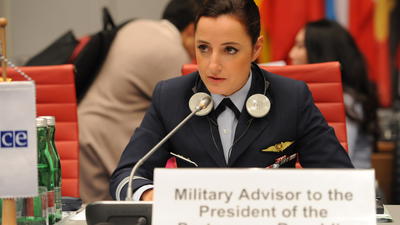-
Our work
-
Fields of work
- Arms control
- Border management
- Combating trafficking in human beings
- Conflict prevention and resolution
- Countering terrorism
- Cyber/ICT Security
- Democratization
- Economic activities
- Education
- Elections
- Environmental activities
- Gender equality
- Good governance
- Human rights
- Media freedom and development
- Migration
- National minority issues
- Policing
- Reform and co-operation in the security sector
- Roma and Sinti
- Rule of law
- Tolerance and non-discrimination
- Youth
- Field operations
- Projects
-
Meetings and conferences
- Summit meetings
- Review Conferences
- Ministerial Council meetings
- Plenary meetings of the Permanent Council
- Plenary Meetings of the Forum for Security Co-operation
- Security Review Conferences
- Annual Implementation Assessment Meetings
- Economic and Environmental Forum
- Economic and Environmental Dimension Implementation Meetings
- Human rights meetings
- Media conferences
- Cyber/ICT security conferences
- Conference of the Alliance against Trafficking in Persons
- Gender equality conferences
- Annual OSCE Mediterranean conferences
- Annual OSCE Asian conferences
- Partnerships
-
Fields of work
-
Countries
- All
-
Participating States
- Albania
- Andorra
- Armenia
- Austria
- Azerbaijan
- Belgium
- Belarus
- Bosnia and Herzegovina
- Bulgaria
- Canada
- Croatia
- Cyprus
- Czechia
- Denmark
- Estonia
- Finland – OSCE Chairpersonship 2025
- France
- Georgia
- Germany
- Greece
- Holy See
- Hungary
- Iceland
- Ireland
- Italy
- Kazakhstan
- Kyrgyzstan
- Latvia
- Liechtenstein
- Lithuania
- Luxembourg
- Malta
- Moldova
- Monaco
- Mongolia
- Montenegro
- The Netherlands
- North Macedonia
- Norway
- Poland
- Portugal
- Romania
- Russian Federation
- San Marino
- Serbia
- Slovakia
- Slovenia
- Spain
- Sweden
- Switzerland
- Tajikistan
- Türkiye
- Turkmenistan
- Ukraine
- United Kingdom
- United States of America
- Uzbekistan
- Asian Partners for Co-operation
- Mediterranean Partners for Co-operation
-
Structures and institutions
- Chairpersonship
-
Secretariat
- Secretary General
- Office of the Secretary General
- Conflict Prevention Centre
- Transnational Threats Department
- Office of the Special Representative and Co-ordinator for Combating Trafficking in Human Beings
- Office of the Co-ordinator of OSCE Economic and Environmental Activities
- Gender Issues Programme
- Opportunities for Youth
- Department of Human Resources
- Department of Management and Finance
- Office of Internal Oversight
- Documentation Centre in Prague
- Institutions
-
Field operations
- Presence in Albania
- Centre in Ashgabat
- Programme Office in Astana
- Programme Office in Bishkek
- Mission to Bosnia and Herzegovina
- Programme Office in Dushanbe
- Mission in Kosovo
- Mission to Moldova
- Mission to Montenegro
- Mission to Serbia
- Mission to Skopje
- Project Co-ordinator in Uzbekistan
- Closed field activities
- Parliamentary Assembly
- Court of Conciliation and Arbitration
- Organizational structure
- About us
Press release
Increased participation of women in the armed forces on the agenda of the OSCE Forum for Security Co-operation in Vienna

- Date:
- Place:
- VIENNA
- Source:
- Forum for Security Co-operation
- Fields of work:
- Conflict prevention and resolution
VIENNA, 13 October 2016 – The need to increase the presence of women in the armed forces was the focus of the OSCE Forum for Security Co-operation meeting in Vienna, held yesterday under Portugal’s Chairmanship.
Speakers stressed the importance of gender equality in the organization and management of the armed forces to ensure that women are represented at the decision-making and operational levels. They also stressed that in order to promote the professional development of women in the armed forces, commitment to a gender-neutral and performance-focused approach is required.
In her opening address, Lieutenant Colonel Diná Azevedo, Military Advisor to Portugal’s President, the first female to occupy this post, reminded participants that “women are not just victims of conflict” and they must be “part of the solution”. Azevedo was also the first women in the Portuguese Air Force to lead a Flight Squadron and the first to be a Wing Commander.
“Women play a relevant role as leaders, especially in helping to end conflict and in developing post-conflict reintegration efforts,” Azevedo said.
Colonel Bakhyt Kassymova, Associate Professor of Military and State Governance in the General Staff Department at Kazakhstan’s National Defence University, noted the added value of involving more women in military leadership as they bring different perspectives to the decision-making process.
Kassymova pointed out that especially in our globalized world, which is facing the threats of terrorism, hybrid wars and new forms of conflict, “involving women in the process of decision-making is becoming increasingly important, in order to elaborate and establish alternative ways of decision-making and management.”
Ambassador Mara Marinaki, the European Union/European External Action Service (EU/EEAS) Principal Advisor on Gender and UNSCR 1325 on Women, Peace and Security, reiterated the EU’s support for the promotion of the OSCE’s agenda on Women, Peace and Security. She underlined that women in leadership positions in the armed forces and in political life serve as role models, especially for younger women and girls, empowering them to make better life choices. She also stressed that accountability for all forms of sexual violence, including the bringing to justice of all perpetrators, and the inclusion of women in peace making, peace negotiations and the implementation of peace agreements remain important priorities of the European Union.